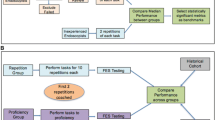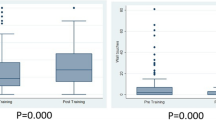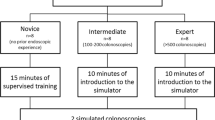Abstract
Colorectal cancer is the second most common cause of death in the USA. The need for screening colonoscopies, and thus adequately trained endoscopists, particularly in rural areas, is on the rise. Recent increases in required endoscopic cases for surgical resident graduation by the Surgery Residency Review Committee (RRC) further emphasize the need for more effective endoscopic training during residency to determine if a virtual reality colonoscopy simulator enhances surgical resident endoscopic education by detecting improvement in colonoscopy skills before and after 6 weeks of formal clinical endoscopic training. We conducted a retrospective review of prospectively collected surgery resident data on an endoscopy simulator. Residents performed four different clinical scenarios on the endoscopic simulator before and after a 6-week endoscopic training course. Data were collected over a 5-year period from 94 different residents performing a total of 795 colonoscopic simulation scenarios. Main outcome measures included time to cecal intubation, “red out” time, and severity of simulated patient discomfort (mild, moderate, severe, extreme) during colonoscopy scenarios. Average time to intubation of the cecum was 6.8 min for those residents who had not undergone endoscopic training versus 4.4 min for those who had undergone endoscopic training (p < 0.001). Residents who could be compared against themselves (pre vs. post-training), cecal intubation times decreased from 7.1 to 4.3 min (p < 0.001). Post-endoscopy rotation residents caused less severe discomfort during simulated colonoscopy than pre-endoscopy rotation residents (4 vs. 10 %; p = 0.004). Virtual reality endoscopic simulation is an effective tool for both augmenting surgical resident endoscopy cancer education and measuring improvement in resident performance after formal clinical endoscopic training.
Similar content being viewed by others
References
Sugden C, Aggarwal R, Banerjee A, Haycock A, Thomas-Gibson S, Williams CB, Darzi A (2012) The development of a virtual reality training curriculum for colonoscopy. Ann Surg 256(1):188–192
Cohen J, Cohen SA, Vora KC, Xue X, Burdick JS, Bank S, Bini EJ, Bodenheimer H, Cerulli M, Gerdes H, Greenwald D, Gress F, Grosman I, Hawes R, Mullin G, Schnoll-Sussman F, Starpoli A, Stevens P, Tenner S, Villanueva G (2006) Multicenter, randomized, controlled trial of virtual-reality simulator training in acquisition of competency in colonoscopy. Gastrointest Endosc 64(3):361–368
Plooy AM, Hill A, Horswill MS, Cresp AS, Watson MO, Ooi SY, Riek S, Wallis GM, Burgess-Limerick R, Hewett DG (2012) Construct validation of a physical model colonoscopy simulator. Gastrointest Endosc 76(1):144–150
McCashland T, Brand R, Lyden E, de Garmo P (2000) The time and financial impact of training fellows in endoscopy. CORI Research Project. Clinical Outcomes Research Initiative. Am J Gastroenterol 95(11):3129–3132
Sedlack RE, Kolars JC (2003) Validation of a computer-based colonoscopy simulator. Gastrointest Endosc 57(2):214–218
Sariego J (2000) The role of the rural surgeon as endoscopist. Am Surg 66(12):1176–1178
Spier BJ, Durkin ET, Walker AJ, Foley E, Gaumnitz EA, Pfau PR (2010) Surgical resident’s training in colonoscopy: numbers, competency, and perceptions. Surg Endosc 24(10):2556–2561
Desilets DJ, Banerjee S, Barth BA, Kaul V, Kethu SR, Pedrosa MC, Pfau PR, Tokar JL, Varadarajulu S, Wang A, Wong Kee Song LM, Rodriguez SA (2011) Endoscopic simulators. Gastrointest Endosc 73(5):861–867
Sedlack RE, Kolars JC (2002) Colonoscopy curriculum development and performance-based assessment criteria on a computer-based endoscopy simulator. Acad Med J Assoc Am Med Coll 77(7):750–751
Koch AD, Haringsma J, Schoon EJ, de Man RA, Kuipers EJ (2008) A second-generation virtual reality simulator for colonoscopy: validation and initial experience. Endoscopy 40(9):735–738
Grantcharov TP, Carstensen L, Schulze S (2005) Objective assessment of gastrointestinal endoscopy skills using a virtual reality simulator. JSLS : J Soc Laparoendosc Surg/Soc Laparoendosc Surg 9(2):130–133
Marshall JB (1995) Technical proficiency of trainees performing colonoscopy: a learning curve. Gastroint Endosc 42(4):287–291
Sedlack RE, Kolars JC (2004) Computer simulator training enhances the competency of gastroenterology fellows at colonoscopy: results of a pilot study. Am J Gastroenterol 99(1):33–37
Ahlberg G, Hultcrantz R, Jaramillo E, Lindblom A, Arvidsson D (2005) Virtual reality colonoscopy simulation: a compulsory practice for the future colonoscopist? Endoscopy 37(12):1198–1204
Walsh CM, Sherlock ME, Ling SC, Carnahan H (2012) Virtual reality simulation training for health professions trainees in gastrointestinal endoscopy. Cochrane Database Syst Rev 6, CD008237
Ritter EM, McClusky DA 3rd, Gallagher AG, Enochsson L, Smith CD (2006) Perceptual, visuospatial, and psychomotor abilities correlate with duration of training required on a virtual-reality flexible endoscopy simulator. Am J Surg 192(3):379–384
Acknowledgments
Study Design: Lu
Data Collection: White
Statistical Analysis: White
Manuscript Drafting: White, Vetto, Lu
Critical Revision of the Manuscript: Buchberg, Vetto, Herzig, Tsikitis, Lu
Study Supervision: Lu
Ian White had full access to all of the data in the study and takes responsibility for the integrity of the data and the accuracy of the data analysis.
Author information
Authors and Affiliations
Corresponding author
Rights and permissions
About this article
Cite this article
White, I., Buchberg, B., Tsikitis, V.L. et al. A Virtual Reality Endoscopic Simulator Augments General Surgery Resident Cancer Education as Measured by Performance Improvement. J Canc Educ 29, 333–336 (2014). https://doi.org/10.1007/s13187-014-0610-5
Published:
Issue Date:
DOI: https://doi.org/10.1007/s13187-014-0610-5




